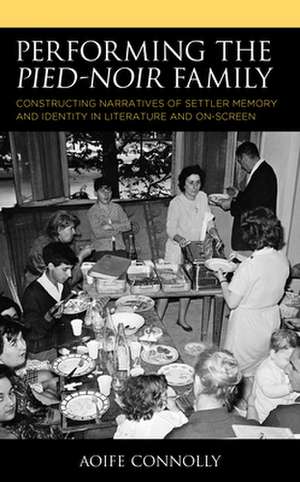Performing the Pied-Noir Family: After the Empire: The Francophone World and Postcolonial France
Autor Aoife Connollyen Limba Engleză Hardback – 15 oct 2020
| Toate formatele și edițiile | Preț | Express |
|---|---|---|
| Paperback (1) | 331.51 lei 6-8 săpt. | |
| Globe Pequot Publishing Group Inc/Bloomsbury – 18 aug 2022 | 331.51 lei 6-8 săpt. | |
| Hardback (1) | 685.68 lei 6-8 săpt. | |
| Rowman & Littlefield – 15 oct 2020 | 685.68 lei 6-8 săpt. |
Din seria After the Empire: The Francophone World and Postcolonial France
-
 Preț: 391.13 lei
Preț: 391.13 lei - 23%
 Preț: 685.09 lei
Preț: 685.09 lei -
 Preț: 364.29 lei
Preț: 364.29 lei -
 Preț: 481.64 lei
Preț: 481.64 lei -
 Preț: 361.40 lei
Preț: 361.40 lei - 23%
 Preț: 614.70 lei
Preț: 614.70 lei -
 Preț: 366.44 lei
Preț: 366.44 lei - 23%
 Preț: 686.15 lei
Preț: 686.15 lei - 23%
 Preț: 649.54 lei
Preț: 649.54 lei - 23%
 Preț: 615.45 lei
Preț: 615.45 lei - 27%
 Preț: 739.63 lei
Preț: 739.63 lei - 23%
 Preț: 685.09 lei
Preț: 685.09 lei - 23%
 Preț: 644.74 lei
Preț: 644.74 lei - 23%
 Preț: 558.34 lei
Preț: 558.34 lei - 23%
 Preț: 647.91 lei
Preț: 647.91 lei - 23%
 Preț: 617.74 lei
Preț: 617.74 lei - 23%
 Preț: 686.44 lei
Preț: 686.44 lei - 23%
 Preț: 649.85 lei
Preț: 649.85 lei - 23%
 Preț: 556.05 lei
Preț: 556.05 lei -
 Preț: 307.38 lei
Preț: 307.38 lei
Preț: 685.68 lei
Preț vechi: 890.49 lei
-23% Nou
Puncte Express: 1029
Preț estimativ în valută:
131.22€ • 135.56$ • 109.21£
131.22€ • 135.56$ • 109.21£
Carte tipărită la comandă
Livrare economică 25 martie-08 aprilie
Preluare comenzi: 021 569.72.76
Specificații
ISBN-13: 9781498537353
ISBN-10: 1498537359
Pagini: 252
Dimensiuni: 152 x 229 x 24 mm
Greutate: 0.52 kg
Editura: Rowman & Littlefield
Seria After the Empire: The Francophone World and Postcolonial France
ISBN-10: 1498537359
Pagini: 252
Dimensiuni: 152 x 229 x 24 mm
Greutate: 0.52 kg
Editura: Rowman & Littlefield
Seria After the Empire: The Francophone World and Postcolonial France
Notă biografică
By Aoife Connolly
Descriere
This book examines literary and cinematic representations of the European settlers of Algeria known as the pieds-noirs following their mass migration to France in 1962. It breaks new ground by focusing on the family trope, including gender and youth, to reveal constructions of collective memory and identity post-Algerian independence.
